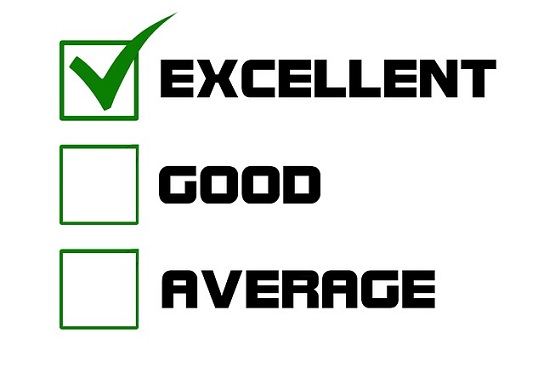
GRE scoring can be confusing. What do the numbers mean? What are they out of? This guide will explain the GRE total score for both the General and Subject Tests, as well as give data on average GRE scores and how well you need to do in order to get a perfect GRE score.
What’s the Total Score for the General GRE?
There are three main sections on the GRE: Analytical Writing (the two essays you write at the beginning of the exam), Verbal Reasoning, and Quantitative Reasoning. This section explains the score ranges for each section and gives a chart for easy reference.
The score range for Analytical Writing is 0-6, in half-point increments. Both of Verbal Reasoning and Quantitative Reasoning are scored the same way. Their score range is 130-170, in one-point increments.
GRE Score Ranges
| Section | Minimum Score | Maximum Score |
| Analytical Writing | 0 | 6 |
| Verbal Reasoning | 130 | 170 |
| Quantitative Reasoning | 130 | 170 |
| Total Score | 260 + 0 | 340 + 6 |
What Does the GRE Total Score Mean?
So, the highest total GRE score you can get would be a 340 (a 170 each in Verbal Reasoning and Quantitative Reasoning), with a 6 in Analytical Writing. However, unlike the SAT and ACT, it’s not common to combine section scores into one GRE total score. Instead, you’d list your three section scores separately when reporting your GRE results.
Why are GRE section scores reported separately? It’s usually because most grad schools are more interested in one section score over the others, and they want to easily see which score you got in that particular section. Grad school programs are more specialized than undergrad programs, and the people looking at your GRE scores are usually concerned only with the section that more closely relates to what your program will be focusing on.
For example, if you’re going into an engineering PhD program, your Quantitative score will be the most important part of your GRE scores, and if you’re applying for a Master’s in Literature, your Verbal score will be much more important. So, keeping section scores separate helps schools easily see how well you did in the section they care most about.
Quick side note: we've created the world's leading online GRE prep program that adapts to you and your strengths and weaknesses. Not sure what to study? Confused by how to improve your score? We give you minute by minute guide.
You don't NEED a prep program to get a great GRE score. But we believe PrepScholar is the best GRE prep program available right now, especially if you find it hard to organize your study schedule and don't know what to study.
Click here to learn how you can improve your GRE score by 7 points, guaranteed.
What Are the Average GRE Scores?
Now you know the GRE total score. But what scores do most people get? Below are percentile rankings for each section of the GRE. The 50th percentile values correspond to the average score for that section. In some cases ETS didn’t provide the exact percentiles listed below, so the data was averaged to get particular percentile values. This data was compiled by averaging all exam scores between July 2012 and July 2015.
Average Scores for the General GRE
| Section | 10th Percentile | 25th Percentile | 50th Percentile | 75th Percentile | 90th Percentile |
| Analytical Writing | 2.5 | 3.0 | 3.5 | 4.0 | 5.0 |
| Verbal Reasoning | 140 | 145 | 151 | 157 | 162 |
| Quantitative Reasoning | 141 | 146 | 152 | 159 | 165 |
So, as you can see, most people score right in the middle of the score ranges for each section.

How Can You Get a Perfect GRE Score?
Are you interested in the GRE total score because you’re trying to get a perfect GRE score? If you’re aiming for a full 170 on both Quantitative Reasoning and Verbal Reasoning sections, know that it will be hard to achieve. Significantly less than 1% of all test-takers get a perfect score on the GRE.
ETS, the organization which designs and administers the GRE, doesn’t disclose the entire process it follows to assign scores. However, by looking at the score conversion table used for the paper-based GRE located on page 118 of the ETS Guide to the Paper-Based GRE, it’s possible to get a general idea of how many questions you can get wrong and still get a perfect GRE score.
For this paper-based GRE score conversion table, you can miss two Verbal Reasoning questions and one Quantitative Reasoning question and still get a perfect score on the exam. We can’t rely on this scale completely, particularly because the paper-based GRE has 100 questions while the computer-based GRE only has 80, but we can use it as a rough estimate.
Remember, this can vary, but from the data we can make an educated assumption that you can probably only miss, at most, one question each on Verbal Reasoning and Quantitative Reasoning and still get a perfect score, so you’d have to do really well on exam day to achieve a perfect GRE score.
Also, as I mentioned above, most programs are primarily interested in either the Verbal or Quantitative score, so getting a perfect GRE score likely won’t do a lot to help your application.
What’s the Total GRE Score for GRE Subject Tests?
There are seven GRE Subject Tests, and each has the same scoring scale. The score range is 200-990, in 10-point increments, so the highest score you could get on a Subject Test is 990.
The Biochemistry, Biology, Cell and Molecular Biology, and Psychology Subject Tests each report subscores for more specific subject areas within the exam. These subscores have a range of 20-99, in one-point increments.
The process for scoring Subject Tests is pretty opaque, especially since each Subject Test has a different amount of questions, but you’d likely have to get nearly every question correct on these exams as well in order to get a full score.
To learn more about GRE Subject Tests, including what information they cover and how you can prepare for them, check out our guide specifically on GRE Subject Tests.

What Does the Total GRE Score Mean For You?
The highest total score you can get on the GRE is a 340; however, section scores are usually reported separately.
For the Verbal Reasoning and Quantitative Reasoning sections, the highest score you can get for each section is 170, and the lowest score is 130. The score scale is based on one-point increments. For Analytical Writing, the score range is 0-6, in half-point increments. All GRE Subject Tests have a score range of 200-990, in 10-point increments. It’s pretty tough to get a perfect score on the GRE, so the average scores are significantly lower than the GRE total score.
You can only get a few questions wrong on the GRE and still walk away with a perfect score, but remember, the GRE is just one component of your grad school application. Spend your time putting together a strong application in many areas rather than putting all your effort into trying to get a perfect GRE score. Even if you were to get the highest possible score on the GRE, it probably wouldn’t help you get into grad school if the rest of your application was weak, and, likewise, non-perfect GRE scores probably won’t hurt you much if you are strong in other areas such as your college grades, letters of recommendation, etc.
What’s Next?
What’s a good GRE score? Learn which GRE score you should be aiming for based on the schools you’re looking at.
Looking for more in-depth information on how the GRE is scored so you can be sure to get every point possible? Check out our guide which explains scoring policies for each section of the exam.
Thinking about taking a GRE Subject Test? Learn who should take them, how important they are, and how you can prepare for Subject Tests.
Ready to improve your GRE score by 7 points?
We've written a eBook about the top 5 strategies you must be using to have a shot at improving your GRE score.
Download it for free now:

